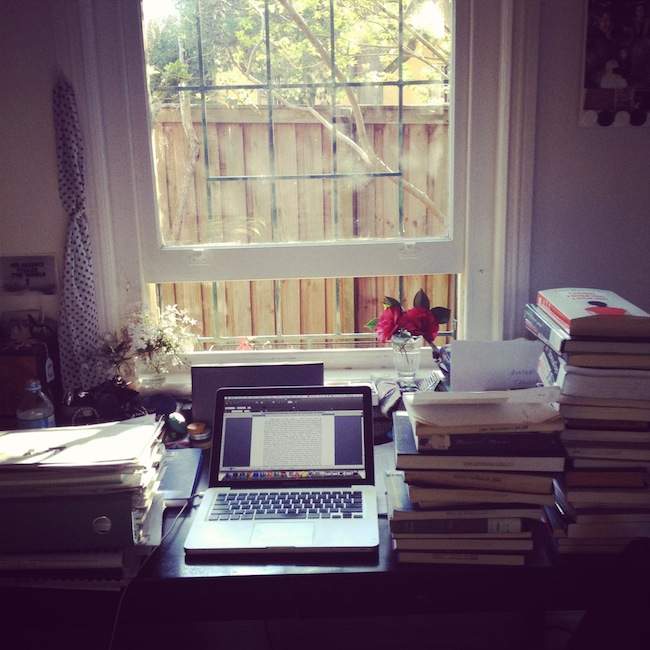How to Get Out of Your Internet Ghetto
Often we end up in a little media bubble, never challenged by new information or opinions. Unless we go looking for it.
The average person spends eight hours a day looking at a screen. That's not just your laptop or television set but also the time you spend on your phone. Observe the number of people thumbing their smart phones on the evening bus, and it's easy to believe that a lot of people exceed that average eight hours on a regular basis.
Now, instead of waxing poetical about how grim this is, and imploring you to run into the streets, pick wildflowers, and dance barefoot (all thoroughly recommended pursuits), it might be better to think about how to get the most out of your time spent with a screen. Because a lot of the time we read, and look, at crap: think of the number of times you’ve heard about Kate Middleton's boobs in the past couple of weeks, or watched a Gangnam Style parody (you know you have).
Last year, Eli Pariser gave a TED talk in which he pointed out that web companies like Facebook and Twitter, in trying to tailor their services to you and your tastes, end up blocking out the information they think you don't want to know about. That means you get trapped inside what he calls a 'filter bubble'. If Facebook knows you're passionately involved in campaigning for gay marriage, for instance, you won't get information that's going to expose you to other arguments in your news feed. By the same token, if Facebook thinks you only want to hear about pop culture, you're not going to end up hearing much about asylum seekers. This means that, ultimately, because we never get information that challenges our worldviews, we end up in a bubble in which we hear the same messages and information over and over again. Unless we go looking elsewhere.
These are the tips we discovered while trying to get out of our media ghetto and into the bright lights of the big media city.

Tidy up your RSS feed and bookmarks
If you use Google Reader, go through and see how many of those subscriptions add value to your life. Balance out what you get from The Sartorialist by subscribing to The Huffington Post, Jezebel, or McSweeney's. Thinking about spreading out your information — so it's not all stories from America — is also a good way to go: you want to know what’s happening around the corner as much as you want to know what’s happening in New York this weekend. (As people who keep an eye on what's happening locally, we unabashedly recommend subscribing to us.)

Buy a newspaper or a magazine
One of the best things about these old-fashioned things is that, while you can skim and skip pieces, what's inside them is curated by an editor. They also offer work that people have been paid to write, and that often produces more interesting and well-researched content. Aside from your average copy of the Sydney Morning Herald or the Age, and high-brow magazines like the Monthly and the New Yorker, magazines like Fantastic Man or The Gentlewoman offer quality journalism mixed in with the pretty pictures. Mag Nation is a good place to browse.

Explore Filtering Services
Filtering services like Prismatic and Bottlenose collate information from your social media activity and provide you with a unique and personal newsfeed. These things are great because they expand your horizons beyond just giving you what you want to hear. The top stories in my Prismatic feed, for instance, cover the US presidential election, architecture inspired by mathematics, and (I don't know what this says about me) a guide to the top 10 hipster neighbourhoods in the US. None of which I would have stumbled across all on my lonesome.

Monitor Yourself
Setting limits about how long you spend on networks is really important. You can leave Facebook or Twitter open all day, but that doesn't mean life will get any more interesting. Set rules for yourself about how long you're prepared to sit monitoring a feed. Wired has a pretty awesome graphic showing how you might spread out your screen time, but I would also recommend going for a walk or baking a cake to give your square-eyes a rest.

Broaden Your Horizons
We’re long past the days when social media meant Facebook alone. It's not uncommon now to meet somebody who would never dream of having a Facebook account but will actively encourage you to follow them on Tumblr, Twitter, and Instagram at once. Different mediums offer different things. Checking out sites like Pinterest and Reddit might broaden your horizons in ways you've never thought of before.

Explore Overlaps
Sometimes the lowbrow and the highbrow blend together in a beautiful dance. Superficial stories can blend in with serious issues. The most recent example of this is Chris Brown's new tattoo. While everyone can marvel over its similarity to that beaten-to-a-pulp image of Rhianna, it provokes more serious discussions about domestic violence and might elevate your thinking about the subject beyond the initial "oh no he didn't!".

Upworthy
Eli Pariser, the same guy who gave the aforementioned TED Talk, has since started a site designed to make important and compelling things as viral as videos of people planking. Designed to give you the tools and knowledge to make yourself a better and more aware human being, Upworthy is still in it's early stages but definitely worth checking out.






